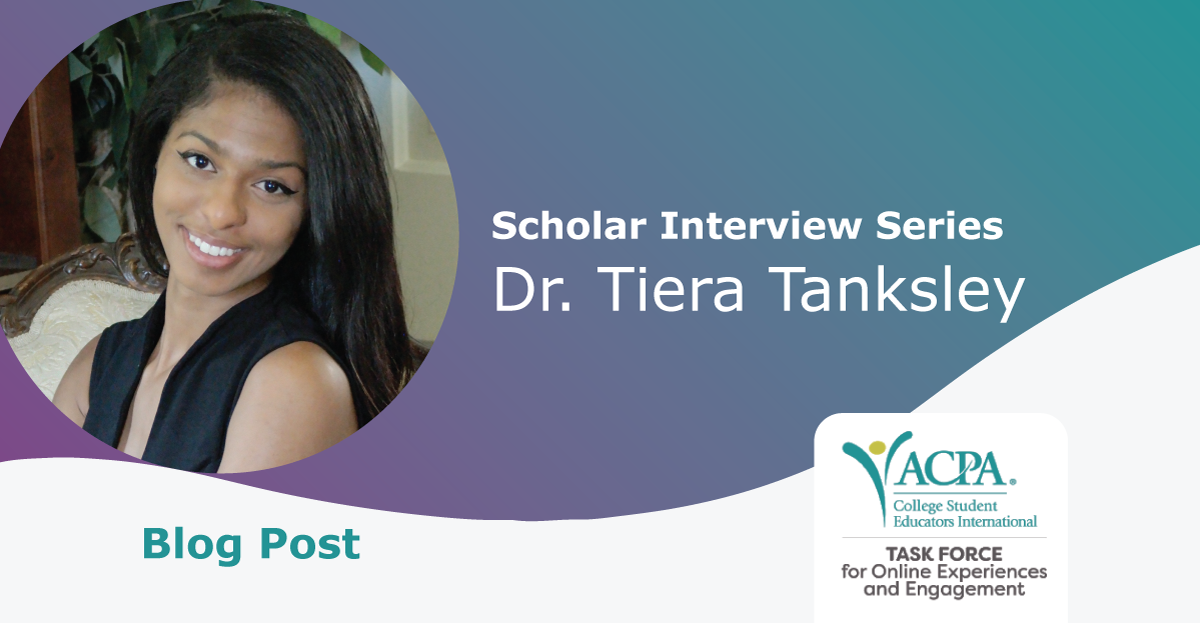
We’re excited to highlight the scholarship of Dr. Tiera Tanksley, Assistant Professor of Equity, Diversity, and Justice in Education at CU Boulder and a Critical Race Technology Fellow at UCLA. She earned her Ph.D. from the Graduate School of Education and Information Studies within UCLA’s Urban Schooling program. Dr. Tanksley’s scholarship, which theorizes a critical race technology theory (CRTT) in education, extends conventional education research to include sociotechnical and techno-structural analyses of school-based technologies. Specifically, her work examines anti-Blackness as “the default setting” of technological hardware, software, and infrastructure, and exposes the academic and mental health consequences of algorithmic racism on Black youth. Her scholarship simultaneously recognizes Black youth as digital and civic agitators and examines the complex ways they subvert, resist and rewrite racially biased digital systems to produce more just and abolitionist experiences for marginalized communities.
We got the chance to ask Dr. Tanksley a few questions about her work:
What led you to this research?
After encountering multiple viral videos of Black people being killed by police, I started to wonder how such graphic content was impacting students, particularly young Black women and girls. Black youth are some of the most visible and vocal groups online, and Black girls sustain some of the highest rates of content creation and consumption across social media platforms. Black girls are also more likely to create and encounter posts about race and racism than other demographic groups, meaning they are more likely to encounter viral death videos (and other racialized traumas) than many of their peers.
My study (Taskley, 2022) revealed several important things. First, it confirmed that Black girls are experiencing high rates of anxiety, depression, fear, and restlessness as a result of viral videos of Black people dead and dying. Second, it showed that Black girls are navigating a complex web of racially taxing experiences online, from racist bullying and bot harassment to biased content moderation and account suspension. Third, and perhaps most importantly, it exposed anti-blackness as the ‘default setting’ of social media technologies, showcasing how algorithms curate content in ways that reify and re-entrench the racialized status quo. This reality is evidenced in the disparate approach to Black pain and suffering as exemplified in my study: that while Black girls’ posts admonishing the state-sanctioned killing of Black Americans were flagged for “hate speech” and “incitement of violence,” their attempts to report racist harassment (including racist slurs and threats of lynching) were considered “free speech” and “legitimate political expressions” by the very same algorithms.
Based on your research, what recommendations do you have for better-supporting students as they navigate online college environments and experiences?
I believe students need more course offerings that prepare them to critically navigate anti-Black digital systems, such as social media and internet technologies, in ways that sustain their mental health and emotional wellness. Such courses need to focus on exposing anti-Blackness as the default setting of digital technologies and showcasing how algorithmic racism shows up in everyday life, both on- and offline. In particular, I believe these courses should foster students’ ability to critically read, resist and ultimately rewrite algorithmically injust systems in transformative and race-conscious ways. To do so, I would suggest offering transdisciplinary, co-taught courses that span the natural and social sciences, including computer science, engineering, ethnic studies, women and gender studies, information studies, human-computer interaction (HCI), and digital humanities.
What do you recommend for new professionals interested in learning more about this work?
I would suggest reading work in digital humanities and critical science and technology studies (STS), including Algorithms of Oppression by Safiya Noble, Race after Technology by Ruha Benjamin, Woke Gaming by Kishonna Gray, and Automating Inequality by Virginia Eubanks. I would also suggest reading “A People’s Guide to Finding Algorithmic Bias,” which provides everyday tips and tools for protecting yourself (and your data) from algorithmic racism.
What’s next for this research project?
Currently, I’m conducting a qualitative study with Black youth that explores their wants, needs, and concerns about artificial intelligence in general, and within the context of EdTech in particular. The long-term goal of this project is to use these insights to develop more race-conscious and justice-oriented AI systems that can help – rather than harm – Students of Color.
You can see Dr. Tanksley present research on algorithmic anti-blackness in EdTech at the 2023 AERA conference this April in Chicago, IL.
Connection to the mission of ACPA’s OEE (Written by Virginia Byrne)
First, Dr. Tanksley’s 2022 article is MUST READ for everyone in Higher Education and Student Affairs. It is one of the most profound works of the year.
Second, Student Affairs professionals from all functional areas should consider how they can support students in learning to, as Dr. Tanksley stated, “critically navigate anti-Black digital systems, such as social media and internet technologies, in ways that sustain their mental health and emotional wellness.” Consider the following reflection questions:
- How do you talk to students about their social media use?
- After students encounter a viral video of Black people being killed by police, how do you engage in them in discussion? How do you hold space for them?
- How do you consider critically navigate social media as a 21st century skill in your First Year Experience courses and other co-curricular programs?
Interested in learning more about Dr. Tanksley?
Visit www.tieratanksley.com or on Twitter at @DrTanksley
References
- Tanksley, T. (2022). Race, education and #BlackLivesMatter: How online transformational resistance shapes the offline experiences of black college-age women. Urban Education. https://doi.org/10.1177/00420859221092970

